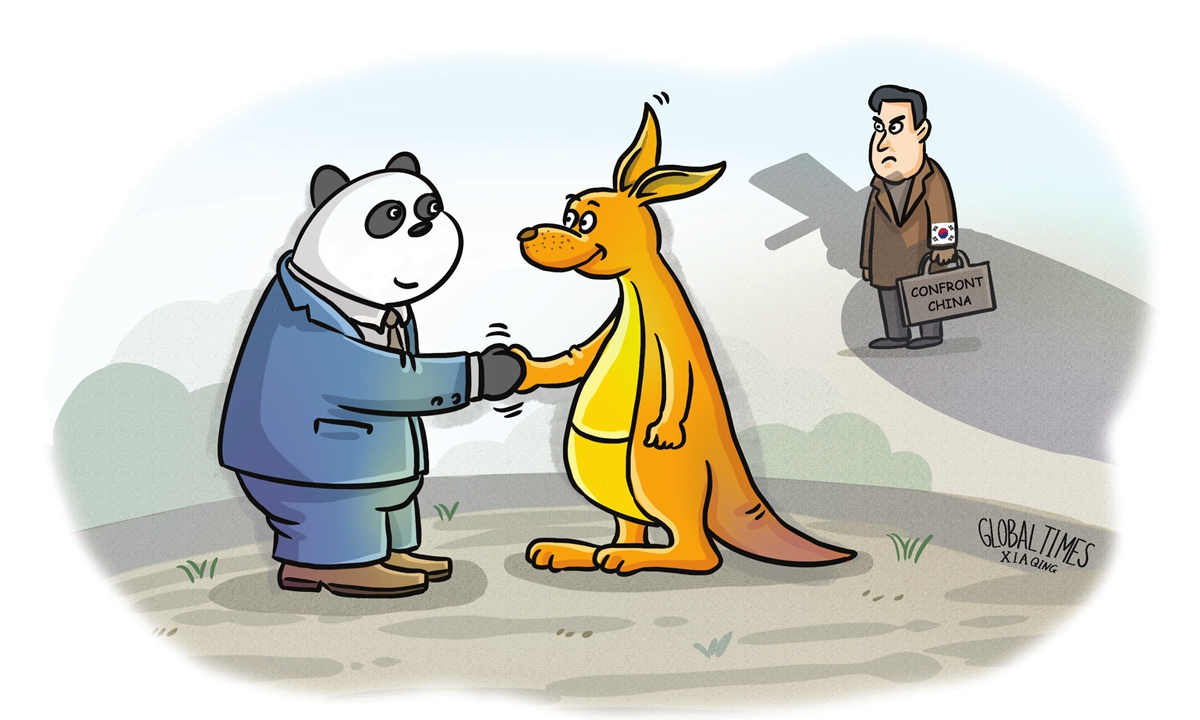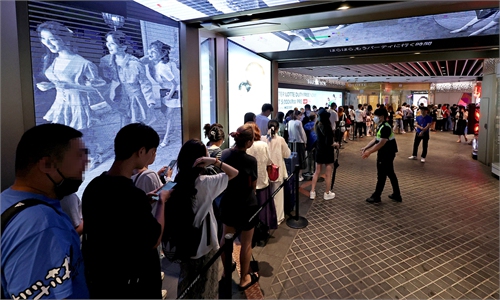
Illustration: Xia Qing/Global Times
Influenced by the US' strategic competition against China, some Western countries have clearly become hostile toward China in recent years. South Korea and Australia, as two typical "middle powers" of similar economic scale which have close trade ties with China, are both US allies in the Asia-Pacific region, and their relations with China have deteriorated for some time. However, the recent "ice-breaking" of China-Australia relations and the continuous "freezing" of China-South Korea relations are in stark contrast.
Recently, China and Australia have witnessed warming ties. Amid the East Asia Summit, Australian Prime Minister Anthony Albanese confirmed on September 7 that he will visit China later this year after talks with Chinese Premier Li Qiang, with both sides agreeing to resume exchanges in various fields. As leader of the Labor Party, Albanese has shown a different stance toward China from his predecessors since he came to power last year. On the same day, the 7th China-Australia High-Level Dialogue was held in Beijing, the first in three years. It is noticed that the Australian delegation covers all sectors of politics, business, academia and the media, with many former politicians from both the Liberal and Labor parties in attendance. This is seen as a consensus between the two parties of Australia to improve relations with China.
Australia's shift has been very positive. However, the same cannot be said about South Korea's performance. Since coming to power in May last year, the Yoon Suk-yeol administration has focused on the South Korea-US alliance, highlighting the "values" orientation of its foreign policy and displaying a distinctive "pro-US" tendency. With regards to its relations with China, the Yoon administration blatantly interferes in the Taiwan question and attempts to follow the US and Japan in terms of the South China Sea issue. These moves have further led to tension and a standstill between Beijing and Seoul.
The Yoon administration, perhaps realizing that its policy toward China is too paranoid, has recently tried to send positive messages to China. In the meeting with Premier Li, Yoon emphasized that the South Korean side is willing to work with China to practice multilateralism and free trade and promote the stable and healthy development of the South Korea-China relationship. However, so far, these signals released by South Korea have not yet been put into practice.
Looking back at the China-South Korea and China-Australia relations over the years, the turning point occurred after the change of government in South Korea and Australia last year. After the Australian Labor administration came to power, it made adjustments to the anti-China "microphone diplomacy" of its predecessor under Scott Morrison and sent out frequent signals to repair relations with China. Therefore, the leaders of the two countries met during the G20 summit in Bali, Indonesia in November last year, which promoted the improvement in bilateral relations.
In contrast, the Yoon administration, which also came to power last year, took the opposite approach, changing the previously balanced route between the US and China to the "pro-US" orientation, which caused the deterioration of its ties with China.
The impact of such two different policy orientations is prominent. From January to July this year, China-South Korea bilateral trade fell 16.6 percent year-on-year. Some analysts said that the negative effects of South Korea's policy of following the US and "decoupling" from China are becoming apparent. Meanwhile, bilateral trade between China and Australia saw an increase of 5.4 percent year-on-year, which is particularly striking against the backdrop of a general slowdown in the global economy. Clearly the improvement of political relations between China and Australia has played a crucial role in boosting bilateral economic and trade ties.
For Seoul and Canberra, there are many similarities in their relationship with Beijing. Both South Korea and Australia have no historical or territorial disputes with China, but have maintained close economic and trade ties. Furthermore, China does not pose any threat to either country. In particular, the Australian and South Korean economies are heavily dependent on trade with China, so stabilizing and developing relations with China is essentially in the national interests of both countries. The latest improvement in China-Australia relations is exactly due to Canberra's return to rather independent and pragmatic policy toward China, which should be an inspiration for the Yoon administration.
As Chinese Foreign Minister Wang Yi put forward during his meeting with the Australian delegation, it is necessary for the two sides to draw useful experience and lessons in the bilateral relations. He urged the two sides to look at each other objectively, calmly and kindly, understand that China and Australia should remain partners rather than rivals, and advance bilateral relations independently and without any influence or interference from any third party. These three points are also helpful suggestions for South Korea.
The author is a research fellow at the China Institute of International Studies. opinion@globaltimes.com.cn

